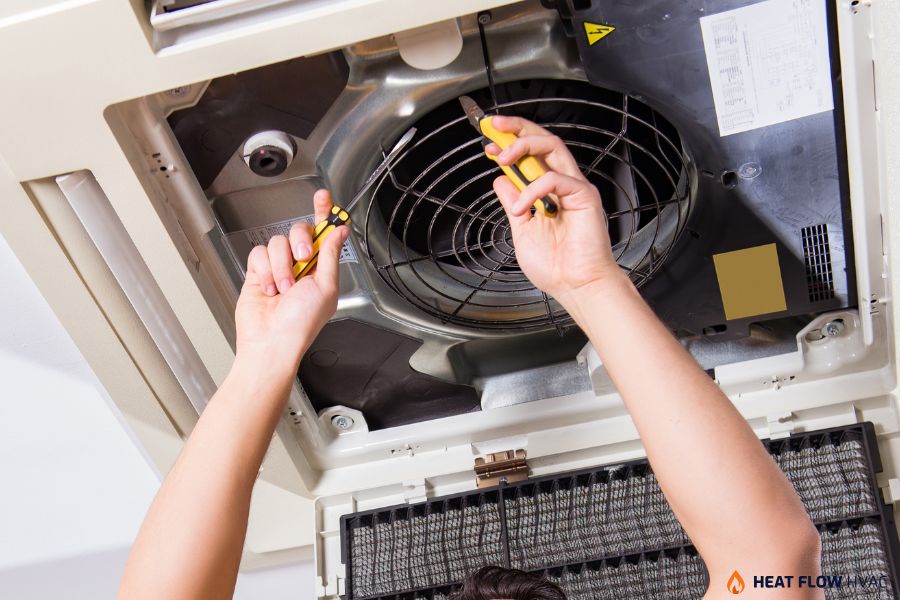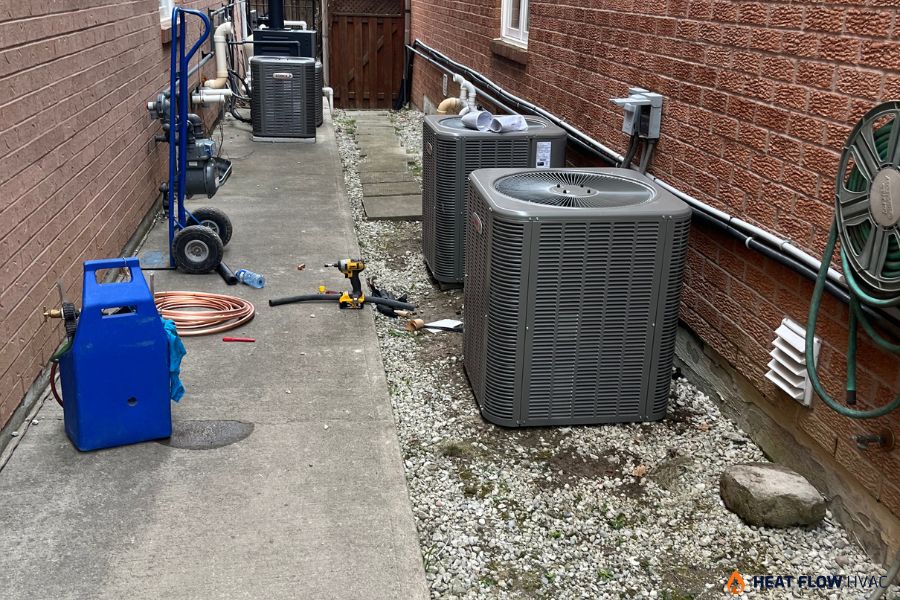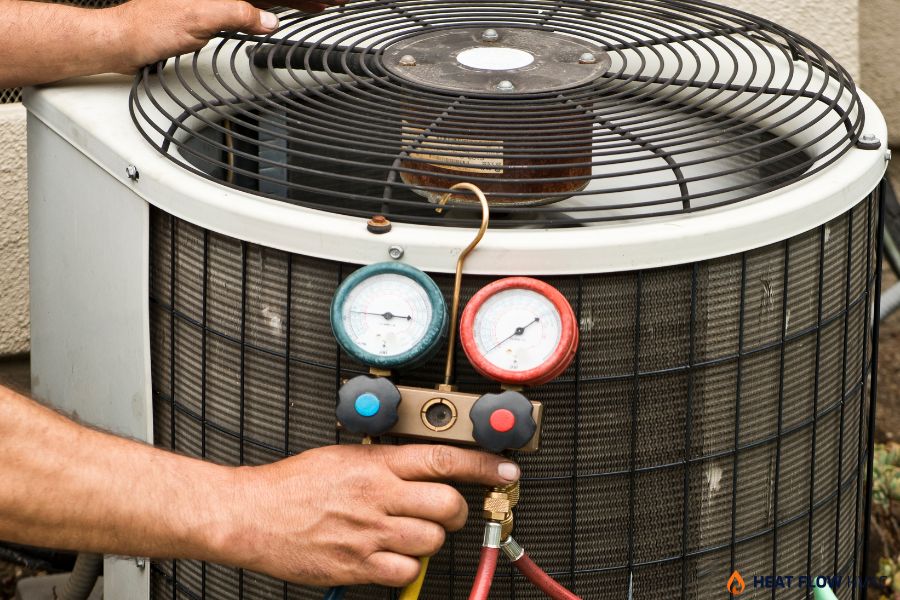When temperatures soar past 30 degrees in Ontario, it’s not uncommon for your air conditioner to seem like it’s running non-stop. But is that a problem? Should you be worried if your AC is running all day without shutting off? At Heat Flow HVAC, we help homeowners across the GTA understand how their system should behave during a heat alert and when that behaviour signals trouble.
This guide will explain how long an air conditioner can run continuously, what factors affect runtime, and what you can do to keep your system safe, efficient, and under control during extreme heat.
Why Your AC Is Running Constantly
In hot, humid Ontario summers, your air conditioner has one job: to maintain the temperature you’ve set on your thermostat. When it’s 33°C outside and you’re trying to keep your home at 23°C, your system may need to run for hours at a time to keep up. In fact, if it shuts off too early, it might not be doing its job properly.
That said, there’s a difference between long, efficient cooling cycles and a system that’s overworking or struggling. Knowing what’s normal and what’s not can help you avoid damage, save money, and keep your home comfortable.

Common Reasons Why AC is Running All Day
Here’s a breakdown of the most common reasons why air conditioners run continuously during extreme heat:
| Reason | Explanation |
|---|---|
| Extreme outdoor heat | When it’s 30°C or more, especially with humidity, the system may run all day just to maintain your indoor temperature. |
| High indoor humidity | Humidity adds to your system’s workload. Your AC is also removing moisture from the air, not just cooling it. |
| Dirty air filter | Reduced airflow means your system works harder and takes longer to cool your space. |
| Undersized AC system | Smaller units may not be powerful enough to cool larger homes, especially during peak hours. |
| Poor insulation or ductwork | Leaky ducts or uninsulated attics let the cool air out and hot air in, forcing the system to run longer. |
| Old or poorly maintained system | Wear and tear, clogged coils, or outdated components can reduce efficiency and extend runtime. |
| Low refrigerant or mechanical issue | The unit may run continuously without effectively cooling, a sign that service is needed. |
Runtime Differences Based on Home Type and Location
In southern Ontario, runtime can vary depending on your home’s layout, age, and insulation. We see these patterns often across areas like Brampton, Toronto, Vaughan, and Nobleton.
Older Homes
Older houses tend to be less energy efficient. They may have minimal attic insulation, single-pane windows, or older ductwork with leaks. These homes typically force AC units to run longer, especially during mid-day heat.
Newer Homes
New builds are more airtight and better insulated. That helps with cooling efficiency, but many come with basic or builder-grade AC systems that aren’t sized correctly. These units often run longer than they should, and performance may degrade over time without regular maintenance.
Homes Near the Lake
Humidity tends to be higher near Lake Ontario. Even if the temperature isn’t extreme, the moisture in the air increases the cooling load. AC systems in these areas work harder not just to cool the air but to remove moisture, which often leads to extended operation.

How Long Can an AC Run Constantly During a Heatwave?
There’s no one-size-fits-all answer, but here are typical patterns:
- On a regular summer day, a central air conditioner should run for 15 to 20 minutes per cycle, a few times per hour.
- During extreme heat, systems may run for 45 minutes or longer per cycle or even all day without stopping, especially from noon to 6 p.m.
- Variable-speed systems from brands like Lennox or KeepRite are designed to run longer at lower speeds. This is normal and more energy efficient than cycling on and off.
If your unit is running all day but your home feels comfortable, it may be working as designed. If it runs all day and you’re still sweating, it’s time to take a closer look.
Signs Your AC Is Struggling
Not all constant runtime is normal. These signs may indicate that your system isn’t keeping up and needs inspection:
- The air coming from the vents is lukewarm
- Your home temperature keeps rising despite continuous operation
- You hear buzzing, rattling, or clicking from the outdoor unit
- The outdoor unit is hot to the touch or shuts off unexpectedly
- There’s water pooling near the system or a strange smell coming from the vents
- Your hydro bill suddenly spikes without a change in thermostat setting
If you notice any of the above, we recommend scheduling an AC inspection. Even small issues like a partially clogged coil can lead to full system failure during a heatwave in Ontario.
How to Help Your AC Cool More Efficiently
When the heat is relentless, it makes sense to help your AC out in any way you can. These steps can reduce runtime without sacrificing comfort.
Simple DIY Adjustments You Can Make if the AC Is Running Constantly
- Close blinds and curtains during the hottest part of the day
- Use ceiling fans to circulate cool air more efficiently
- Change your air filter every 30 to 60 days in summer
- Set your thermostat to 24 or 25 degrees rather than 21 or 22
- Keep doors closed to unused rooms to reduce the cooling zone
- Avoid running ovens, dryers, and other heat-producing appliances in the afternoon
- Seal air leaks around windows and doors
Every home is different, but these changes often reduce the load enough to prevent overuse.

Is It Safe for an AC to Run All Day?
For a well-maintained, properly sized system, yes, it’s safe to run all day during a heatwave. In fact, newer two-stage and variable-speed systems are built to run for longer stretches rather than cycling on and off.
Problems start when systems are dirty, improperly sized, or already worn out. That’s when continuous runtime becomes a strain and leads to premature breakdown.
Common consequences of overuse include:
- Overheating electrical components
- Short cycling caused by system stress
- Frozen coils from reduced airflow
- Compressor burnout
- Tripped breakers or safety shutoffs
These are preventable with proactive maintenance. That’s why we always recommend an early summer tune-up and a second check-in during peak heat.
When Should I Call for an AC Inspection?
You don’t have to wait for the system to stop working before calling for help. If your AC is running constantly and you’re not sure if it’s normal, it’s best to get it looked at.
At Heat Flow HVAC, we offer full inspections and performance testing across the GTA. Whether you have an older unit or a brand-new system from a top brand like Lennox or KeepRite, we can assess how it’s holding up under pressure and what you can do to make it run better.
We’re here to help homeowners feel confident in their system, not just when it’s working, but when it’s working harder than ever.
FAQs About AC Running Constantly
Is it normal for my AC to run all day during extreme heat?
Yes, if the outdoor temperature is above 30°C and your system is reaching your desired indoor temperature, long cycles are expected. But if it runs all day and the house is still warm, there could be an issue.
How do I know if my AC is running too long?
If it’s running non-stop but not cooling, or you notice strange sounds, warm air, or a jump in your hydro bill, it’s time to schedule a service.
Does running the AC all day wear it out?
A properly maintained system can handle long runtimes. But dirt, poor airflow, or low refrigerant levels can cause long-term damage if left unchecked.
How often should I get my AC serviced?
We recommend a full inspection at least once a year, ideally in the spring or early summer. If your AC is running constantly, it may need a mid-season checkup too.
Can I fix AC issues myself?
You can check the air filter, clear debris from the outdoor unit, and seal air leaks. But issues like refrigerant levels, electrical faults, or compressor problems should always be handled by a licensed technician.